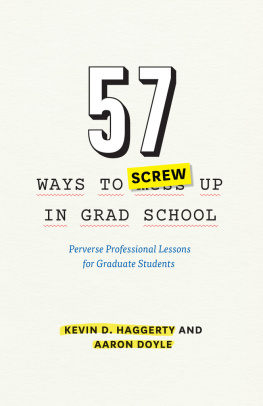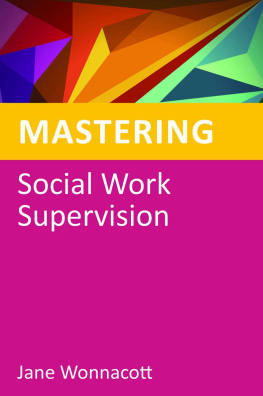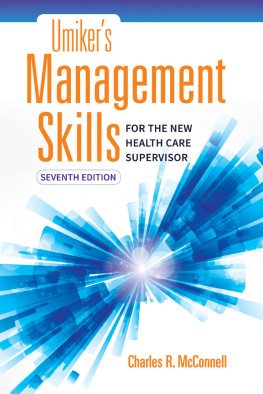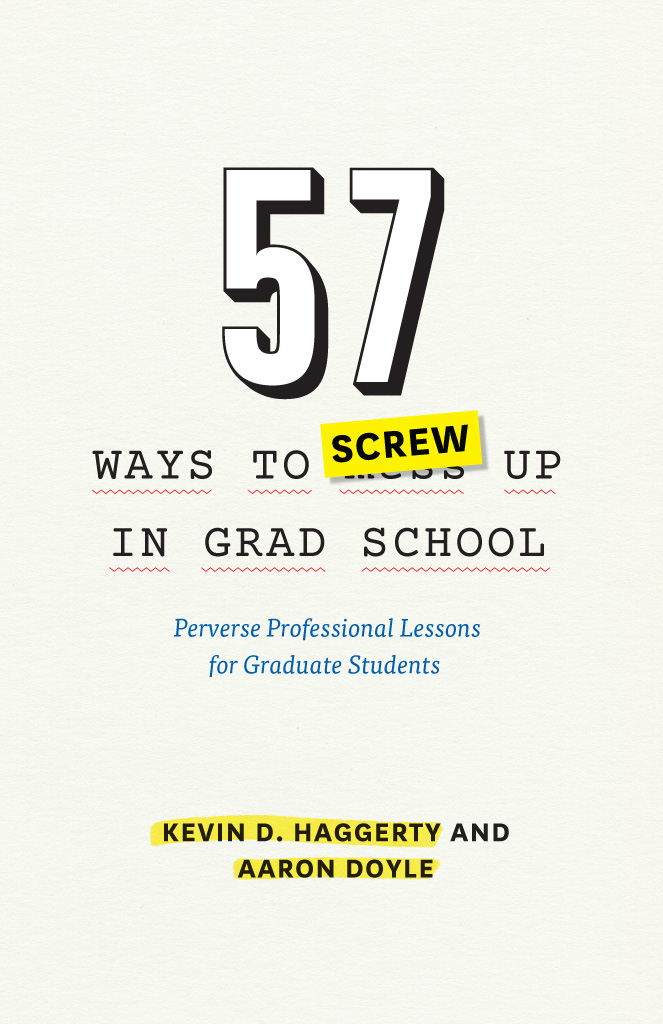Andrew B. Ayers
Victor A. Bloomfield and Esam El-Fakahany
Alan Brinkley, Esam El-Fakahany, Betty Dessants, Michael Flamm, Charles B. Forcey Jr., Matthew L. Ouellett, and Eric Rothschild
C. Ray Chandler, Lorne M. Wolfe, and Daniel E. L. Promislow
Frank F. Furstenberg
John A. Goldsmith, John Komlos, and Penny Schine Gold
Jon B. Gould
Arthur W. Kornhauser
Bruce M. Shore
57 Ways to Screw Up in Grad School
Perverse Professional Lessons for Graduate Students
Kevin D. Haggerty and Aaron Doyle
The University of Chicago Press
Chicago and London
Kevin D. Haggerty is a Killam Research Laureate and professor of sociology and criminology at the University of Alberta. He is also editor of the Canadian Journal of Sociology. Haggertys most recent book is Transparent Lives.
Aaron Doyle is associate professor in the Department of Sociology and Anthropology at Carleton University. His most recent book is Eyes Everywhere.
The University of Chicago Press, Chicago 60637
The University of Chicago Press, Ltd., London
2015 by The University of Chicago
All rights reserved. Published 2015.
Printed in the United States of America
24 23 22 21 20 19 18 17 16 15 1 2 3 4 5
ISBN-13: 978-0-226-28087-5 (cloth)
ISBN-13: 978-0-226-28090-5 (paper)
ISBN-13: 978-0-226-28106-3 (e-book)
DOI: 10.7208/chicago/9780226281063.001.0001
Library of Congress Cataloging-in-Publication Data
Haggerty, Kevin D., author.
57 ways to screw up in grad school: perverse professional lessons for graduate students / Kevin D. Haggerty and Aaron Doyle.
pages; cm. (Chicago guides to academic life)
Includes index.
ISBN 978-0-226-28087-5 (cloth: alk. paper) ISBN 978-0-226-28090-5 (pbk.: alk. paper) ISBN 978-0-226-28106-3 (e-book) 1. Graduate studentsConduct of life. 2. Universities and collegesGraduate work. I. Doyle, Aaron, author. II. Title. III. Title: Fifty-seven ways to screw up in grad school. IV. Series: Chicago guides to academic life.
LB2371.H34 2015
378.1'55dc23 2015002171
This paper meets the requirements of ANSI/NISO Z39.48-1992 (Permanence of Paper).
For Richard V. Ericson
Contents
Liam faced a problem familiar to many masters students. He had spent months looking for people to interview for his thesisa study of the experiences of recent Egyptian immigrants to Chicago. It was becoming increasingly clear, however, that he was not going to find enough of them to finish his research on time. What was he going to do? He planned to start his PhD in the fall.
After many days of agonizing, he hit on a desperate answer. Ingeniously, he decided to approach individuals who knew Egyptiansbut who were not themselves Egyptianand ask them to describe growing up in Egypt, immigrating to America from Egypt, and so on, by pretending to be Egyptian. We do not know exactly what was going through his head. The world will never know how he pitched this to them, or what the interviewees thought about it all: You are doing research on how well people can fake being Egyptian? Okay. Sounds worthwhile to me. Did you get a grant for this? We will never know if at some level Liam convinced himself that his approach was legitimate.
Liam committed academic fraud and got busted. But his problems did not stop there. A graduate chair learned about Liams innovative approach to data collection while she was evaluating Liams PhD application. Liams file had been near the top of the admissions list. But now he had screwed that up in a way that would become local legend.
As they finish their undergraduate degrees, some students think about going on to grad school. You might have always known that a masters or PhD was in your future, or a friendly professor might have encouraged you to think about it. Or maybe you just have a deep commitment to prolonging your impoverished, three a.m. Cup-of-Noodles-eating, term-paper-procrastinating, angst-laden student years well into your thirties and beyond. For a number of reasons, more people than ever are going to grad school. This can be an excellent choice, as careers in higher education and related areas can be personally rewarding. It can also be a great opportunity to mess up your life, if done for the wrong reasons or done badly. Few screw-ups will approach the magnitude of Liams fake Egyptian interviews. But there will be many chances to foul things up, sometimes in serious ways. For anyone, the prospect of grad school can be daunting, as it involves committing many years to a strange new stage of education, with no guarantee you will find a job after you graduate.
Given the stakes involved, one peculiar aspect of grad school is the number of students who seem indifferent to its pitfalls. Year after year many run headlong, like lemmings, into the same blunders as their predecessors. Yet a good share of these people ignore or are even hostile toward the advice that might help them avoid screwing up.
Having repeatedly witnessed this process, we have concluded that a small group of students actually want to screw up. We do not know why. Maybe they are masochists or fear success. Maybe they say to themselves, A good day is a day where I move one step closer to crushing my dreams. Maybe they are working out deep-rooted psychological issues. Whatever the reason, our heart goes out to them. Indeed, this book will help them. It sets out a course of action that will ensure they blunder through grad school in a spectacularly disastrous fashion.
Graduate school usually involves completing a masters degree or a PhD (also known as a doctorate). Such degrees exist, with different names, in the natural and applied sciences, humanities, social sciences, and education. A masters degree works out well for most people who start one; a PhD is a more risky undertaking. With a masters, you can expect to finish in a reasonable amount of time and be in a better place than where you started. If you cannot complete it, you will have endured only a couple of years of suffering. But a PhD is a much greater investment. Botching it up can cost you most or all of a decade of your prime yearsand can inflict grievous and irreparable damage on your career prospects, lifelong finances, key relationships, and self-respect.
People seek out graduate degrees for many reasons, not all of them good ones. For most students, grad school is a stepping-stone to a career. With the PhD, that career is often in the university or college system, or sometimes in related fields. So, screwing up means not only making mistakes that mess up your grad school experience but also committing blunders that limit your chances of landing a good job or having a rewarding career afterward. The screw-ups we identify are of varying degrees. Some will undermine or even cut short your graduate education, while others involve less serious matters that will simply make your grad school days less rewarding and more unpleasant than they need to be.









